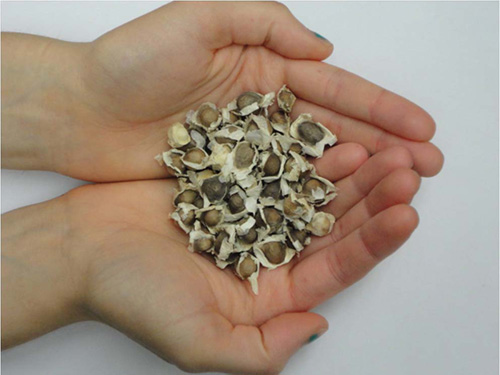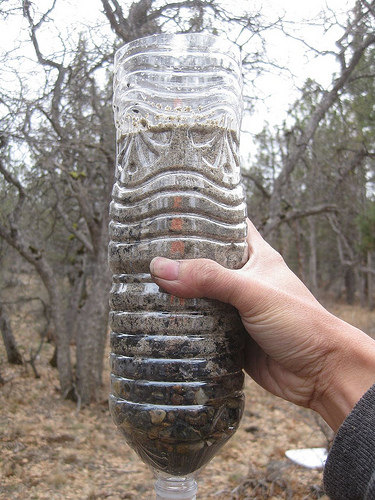Cheap, Sustainable Water Filter Made from Seeds and Sand

In many of the same hot regions of the world prone to drought and water contamination grows a tree whose seeds attract and kill bacteria in water. It's a thin-branched, gangly-looking plant scientifically known as Moringa oleifera and commonly called a drumstick tree, for the shape of its seedpods. Some are also optimistically calling it "the miracle tree."
A few research groups are looking into how to use the seeds from the Moringa tree to clean drinking water. One group, from Pennsylvania State University, is developing a special, antibacterial Moringa sand that it hopes people could easily make at home and use to filter their own water.
"The idea is that as long as people have [ordinary] sand and Moringa seeds, they can clean water," said Stephanie Velegol, a chemical engineer who is leading the Penn State research. Moringa trees are common in many water-stressed regions of Asia, Africa and South America, and one mature tree can produce as many as 15,000 seeds. "We always wanted a sustainable approach," Velegol told InnovationNewsDaily. She and her colleagues published their research in November, in the journal Langmuir.
To make the antibacterial sand, Velegol's team crushed Moringa seeds and mixed them with water. After an hour, the team members poured off the water onto some ordinary sand, discarding the solid bits of Moringa. After another hour, they rinsed the sand and found its grains now had active, antibacterial protein from Moringa seeds tightly stuck on their surfaces.
They also found the Moringa-ed sand could now kill E. coli bacteria in water. It could make clay clump out of solution, turning muddy water clearer. The researchers now have to determine how effective it is against other bacteria.

The advantage of treating water with the Moringa sand instead of simply stirring crushed seeds into it is that water with crushed seed in it will soon become dirty again. Though the seed is antibacterial when fresh, new bacteria will grow on the seed debris. "Water treated with crude [Moringa] extract should not be stored for more than 24 hours," wrote Habauka Kwaambwa, a chemist at the University of Botswana who studies Moringa seeds, in an email to InnovationNewsDaily.
"It is a big problem," said Jacqueline Firth, who as a Brown University medical student studied Moringa seeds for water purification. Firth is now a physician in Botswana who provides tuberculosis and HIV/AIDS care.
Sign up for the Live Science daily newsletter now
Get the world’s most fascinating discoveries delivered straight to your inbox.
Moringa seeds might generally prove more appealing than chlorine, which many governments now distribute to people who drink untreated water from wells, rivers and ponds. Firth found that villagers she worked with in India hated the taste of chlorinated water. They were happy, however, to use Moringa seeds, which they already added to their cooking. Other studies have found that among people who try chlorine powders, half or fewer continue to chlorinate their water, even though it's proven to prevent diarrhea.
When it comes to providing clean water for people, it's not just about the technology. "There are a lot of social challenges that need to be addressed," Velegol told InnovationNewsDaily. "I think it's a good start to be using materials that they already have."
Velegol has a few more questions to answer before her sand is ready to be tested with a village or town. She'll need to check how much Moringa seed is needed to clean a given volume of water. She'll have to see if the special sand kills microorganisms besides E. coli. If the sand isn't enough to make contaminated water drinkable, perhaps it could be used alongside chlorine, reducing how much unpalatable chlorine is needed to clean the water, Velegol said.
With enough funding, the sand could be ready for testing in a water-stressed village in a year, Velegol said. That will be the big reality check: While many studies have confirmed Moringa's antibacterial properties in the lab, there is little research on how well Moringa-seed water-cleaning works in actual villages and towns. Firth ran one of the only field tests, reported in 2010 in the American Journal of Tropical Medicine and Hygiene. She found crushed Moringa seeds didn't significantly clean water in her village. "We're still not sure why it didn't work," she said.
Meanwhile, other scientists are working on different Moringa seed water cleaners, as so many studies have shown it works in lab.
"I come from a village where the source of water is river and you find situations whereby people upstream are bathing and washing whereas those downstream are drawing water to drink. No wonder there are health problems due to the poor water quality," Kwaamba wrote. "I believe that such a filter is not far off from being used by the rural folks."
This story was provided by InnovationNewsDaily, a sister site to LiveScience. You can follow InnovationNewsDaily staff writer Francie Diep on Twitter @franciediep. Follow InnovationNewsDaily on Twitter @News_Innovation, or on Facebook.









